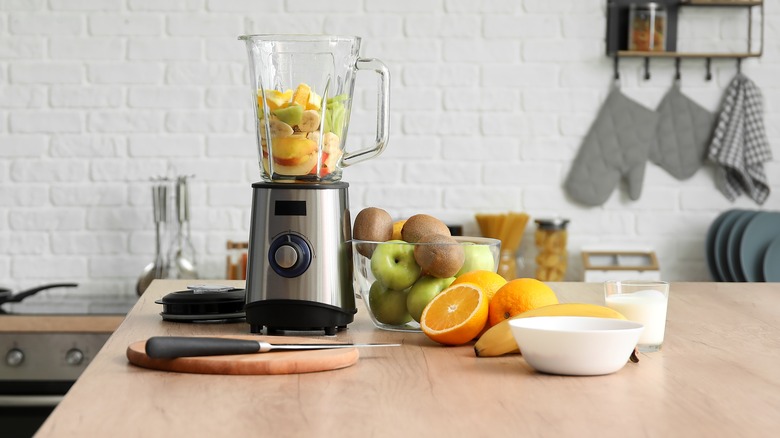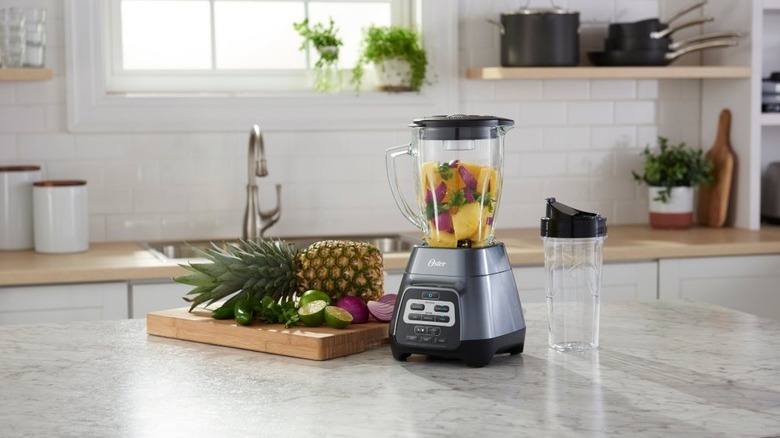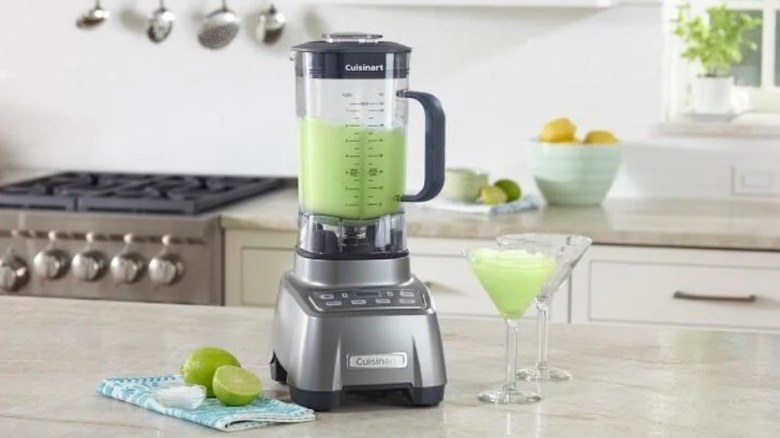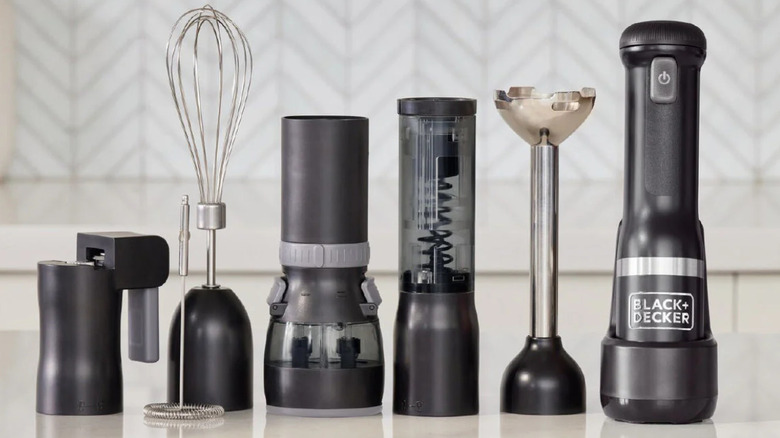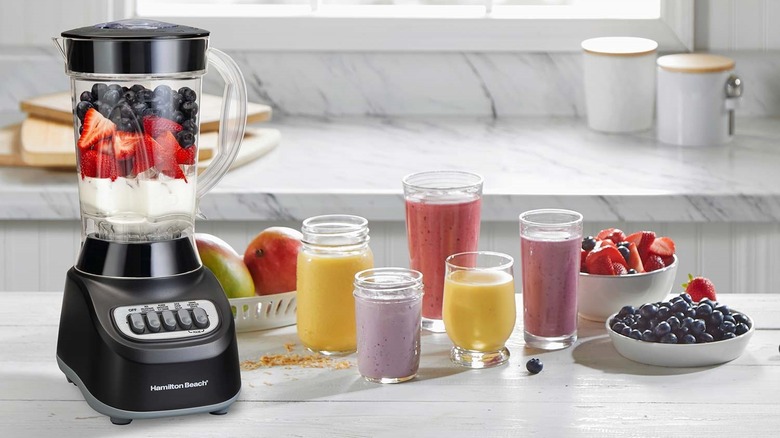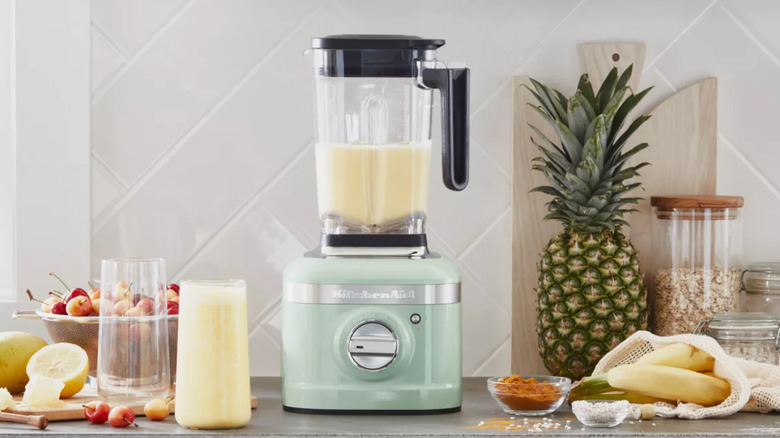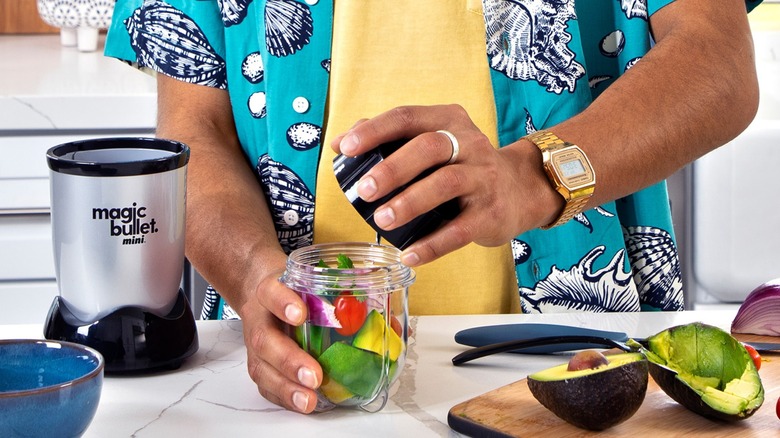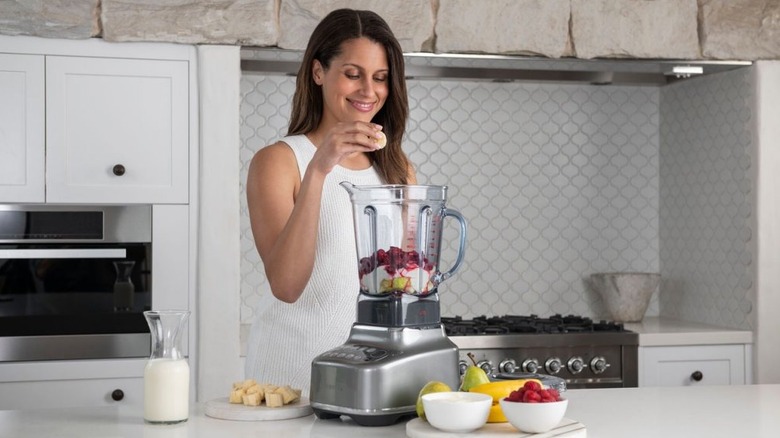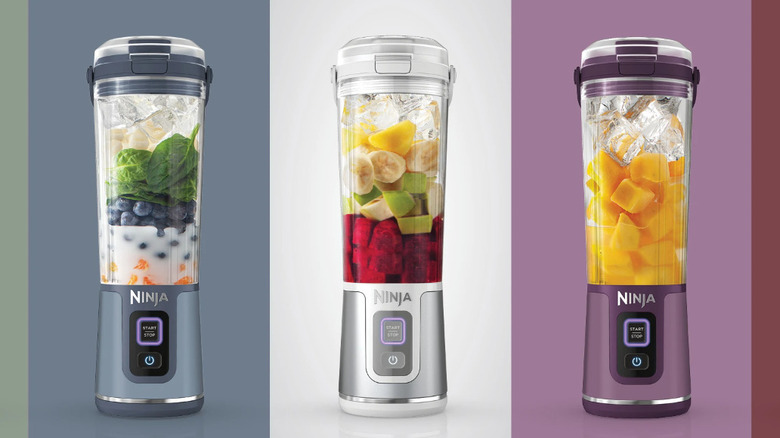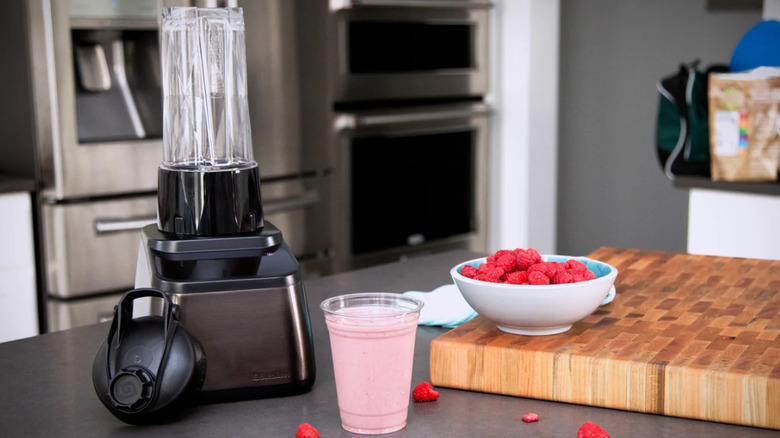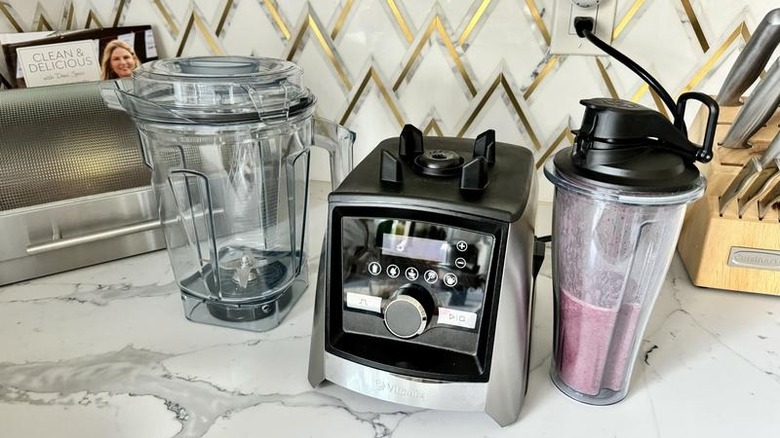Every Major Kitchen Blender Brand Ranked Worst To Best
Buying a blender isn't a major purchase for most consumers, but you might regret a hasty buying decision while scraping smoothie chunks out of a broken one. A poor-quality appliance can get in the way of daily life. A good-quality one can make it easier (and tastier).
There are no guarantees with any appliance — unless the manufacturer offers one — but some blender brands are rated better than others. That means lower odds of malfunctions, plus better (and faster) smoothies. No matter what you want to blend (smoothie or otherwise), performance is important. Price, warranty coverage, and reviews are all important when shopping for a blender.
To help you find the best product, our kitchen blender brand ratings consider price, product reviews, consumer experiences, and manufacturer information. We've even included information on a big-name company that uses specific brands, so if your budget permits, you can achieve the same results at home.
10. Oster
Oster is a recognizable blender brand, but that doesn't mean it's worth buying. Of all the blenders on the market, Oster's might be the easiest to find in stores like Walmart and Target. At Oster's starting price point, consumers can expect basic features like plastic (BPA-free) blending jars and minimal settings
Oster blenders range from $30 to over $100, with higher-end models earning better reviews. The higher-priced models offer features like touchscreen technology, more blending settings, and attachments for food processing and single-serve beverages. They also include glass instead of plastic blending jars.
Overall, reviews aren't great on Oster's website, suggesting most models don't meet expectations. Granted, reviews are higher on the glass-jar and other Oster models, most of which seem to be priced closer to $80. Reviews are also higher on other retailers than on Oster's brand website.
Of all the blender brands we reviewed, Oster's had the most disappointing performance, with a wide breadth between the cheaper, low-reviewed models and the pricey, higher-end ones. If you're not passionate about your daily smoothie, an Oster model might be a handy addition to your appliance collection, but if you want more features and reliability, keep looking.
9. Cuisinart
Cuisinart is a well-known brand for more than just blenders. The brand offers average-to-middle-rated appliances, with some earning better reviews than others. Despite its multiple appliance offerings, Cuisinart is more of an entry-level competitor, and that includes its blender quality.
For example, Cuisinart barely cracks the top 10 in our best microwave brands rankings, due to high pricing and few features. Its blenders perform similarly; reviews don't often pass four stars, despite the higher price point. Cuisinart's blenders range from $80 to over $400, and, as expected, the pricier models earn better reviews.
The most affordable Cuisinart models (around $80) are low-capacity, small models that can handle one or two servings at a time. Higher-priced models are larger and with multiple functions; a juicer-blender combo is one option, while a blender with food processor capabilities is another.
Unless you're comfortable with spending $400 on a blender, it's hard to expect much from a Cuisinart blender. With limited capacity and capabilities, a Cuisinart blender from Walmart might come with some fun accessories. For example, the Hurricane has juicing functions and comes with a blender cup, lids, and straws, but it tops out at four out of five stars.
Other brands offer more affordable blenders with better reviews and more functionality, so a Cuisinart blender may be something of a gamble.
8. Black + Decker
Black + Decker is best known for manufacturing power tools, and the brand seems to do a good job with that. It turns out that Black + Decker also makes blenders, to mixed reviews, whether you buy one from Home Depot or Walmart.
Black + Decker blenders are not the highest-ranked on the market, but they're hardly terrible, either. A Black + Decker cordless immersion blender costs around $80, with kits including add-ons and accessories going up from there. The brand also has personal blenders that are single-serve, as well as a couple of full-size blender models.
The bad news is that the actual full-size blenders are the ones with the worst performance. At just over $30, the 10-speed Black + Decker blender seems like a good deal, with the manufacturer calling it "simple and efficient." Reviews seem to dispute that, with some consumers saying the blender was average or decent and others complaining of broken parts (including the plastic base).
Some reviewers did have praise for Black + Decker's 10-speed blender, but on the brand's website, most reviews had disclaimers that they were collected during a "promotion."
7. Hamilton Beach
Hamilton Beach blenders are a retail favorite and some of the most affordable options on the market. With that low price comes the expectation that a Hamilton Beach blender won't last long, but the reviews aren't terrible, helping Hamilton Beach inch a bit lower down in these worst-to-best rankings.
Hamilton Beach has quite a variety of blenders, starting at around $20 (for a fun-colored personal-size blender), with models specifically for smoothies (called "Smoothie Smart"), low-noise options (Wave~Action and Quiet), and kits with accessories and add-ons.
Plus, if you want a mint-hued, bright red, blue, or coral blender on a budget, Hamilton Beach is the only reasonable choice. Reviews are tougher to track down with this brand, but it's not clear what Hamilton Beach is necessarily hiding. Reviews are mostly good, with various models earning four stars on Walmart's web store.
The only drawback to Hamilton Beach products is that at such a low price, it's practically assumed the quality won't be great. If you want an appliance that lasts 20 years, this might not be it. A Hamilton Beach blender might be worth it if you don't mind something that's fun (or useful) for just a little while.
6. KitchenAid
KitchenAid has a decent reputation as a reliable home brand across various appliances, including ranking as one of the best kitchen stand mixer brands. Unlike some other brands, KitchenAid does a few different things very well. KitchenAid is also one of the few appliance brands still manufactured in the United States, which could be a crucial deciding factor for some consumers.
Starting at around $200, KitchenAid blenders are well-rated but pricey for the average consumer. With fancy color options like "Blue Velvet," "Dried Rose," and "Hibiscus," prices in the hundreds maybe shouldn't be surprising, but the quality is decent, too.
Ratings vary by model, but many of KitchenAid's pricier blenders have rave reviews; the 2022 "Color of the Year" (Beetroot, a dark reddish-purple) blender averages 4.7 stars, and the Hibiscus model (2023's Color of the Year) earned 4.9.
The only drawback with a KitchenAid blender is that the cheaper models are single-serve and still a bit expensive (around $80) for what they are. If you're in the market for a blender that will last, it may be worth splurging on one of KitchenAid's high-end models (even if you don't choose a bold color palette).
5. Nutribullet
Nutribullet is one of the most well-known brands in the blender world, and tens of thousands of reviews seem to confirm that it's a worthwhile investment. The brand isn't perfect, but if you lean more toward food processing than simply blending, you'll like the Nutribullet approach.
Nutribullet blenders range anywhere from $50 to over $200, depending on the style and attachments. The best-performing, review-wise, seems to be the PRO version, which is a single-serving style blender that costs around $100. Other well-rated models are the Triple Prep System (personal blender, larger capacity blender, and a food processor) and the Nutribullet Ultra. Nutribullet also sells blenders for baby food, although the base model Nutribullet seems quite capable of blending most foods into purees or thinner.
A highlight of Nutribullet is its warranty system; a one-year warranty is standard, but the Nutribullet Ultra's blade has a five-year warranty that covers bearing, gasket, coupling, and other possible malfunctions. Consumers can also purchase an extended three-year warranty on any Nutribullet blender.
The one drawback is the price and availability of models; a standard full-size blender costs upward of $140 with Nutribullet, while the single-serve style has more options.
4. Breville
Breville is something of an anomaly in the blender world. The brand offers very few blenders but takes them quite seriously. Breville's coffee maker is rated one of the best, so it only makes sense that the brand's blenders are good quality, too. Breville's website even has a quiz for you to find your perfect blender or juicer.
That said, there are only three options on Breville's website, so you don't have many choices. On other retailers (like Walmart), there are more options, and all appear highly rated. The only drawback is that the cheapest blender is $200 and has limited features; only a timer and nine controls. An added vacuum pump (to make smoothies and milkshakes light and fluffy) costs extra, too — but the fact that it exists says a lot about Breville.
High-end home retailers like Williams-Sonoma, Crate & Barrel, and Sur La Table carry Breville blenders, and consumers give every model excellent ratings. Breville blenders also have stellar (and countless) reviews on Amazon, making this a no-brainer purchase if your blender budget is high enough. The only possible issue is that there doesn't appear to be an extended warranty option. Rather, Breville's warranty spans one year (and requires that you have your receipt).
3. Ninja
Ninja blenders are manufactured by a company that also manufactures other appliances, but that doesn't mean it isn't an expert in blending. You can find Ninjas at any retailer or home goods store, including Amazon, and they receive high reviews all around.
Ninja blenders range between $60 and $250, and their reputation precedes them. From kitchen systems to single-serve models, Ninja has lots of choices, too. The traditional Ninja blender starts at $90 and has three "IQ" programs for different drinks: smoothies, nutrient extractions, and frozen beverages. Higher-priced blenders offer additional features, tougher blades, and more accessories.
Like other high-end blenders, Ninja blenders have earned tens of thousands of positive reviews on various retailers. Despite containing a lot of plastic (where some blenders use metal), Ninja blenders seem to stand up over time, and extended warranties are available just in case something goes wrong.
The max warranty for Ninja blenders is seven years, and consumers tend to agree it's not too expensive (warranty costs depend on the model). One potential issue, however, is that consumers suggest Ninja is reluctant to cover warrantied products even if they break after normal use.
2. Blendtec
Blendtec once blended an Apple Watch into dust, which suggests your produce has no chance and makes Blendtec one of the best brands available on the market. If wimpy blades or lumpy smoothies are a common problem in your kitchen, the fact that Blendtec can grind up metal and plastic should be a positive sign.
Blendtec isn't quite as prolific as, say, Ninja, but the hundreds of reviews across retailers are reliably positive. Blendtec blenders are also multi-function, with the brand's advertising touting that you can make blended drinks, hot soups, and even juice thanks to the all-in-one design.
Blendtec models range from $300 to around $700, so you're paying for the multi-function capabilities, but it seems like a decent deal. Classic Blendtec blenders cost between $320 and $450, and while there aren't bright color options or accessories, the function is all there.
Blendtec blenders have multiple settings for blending, timed cycles, cleaning, and more, and each comes with a two-year warranty by default. Extended warranties are also available, though some consumers lament that the older models had longer warranties (of seven years).
1. Vitamix
Vitamix blenders typically need no introduction. The brand blew up similarly to Ninja and Nutribullet, with many a health and fitness content creator singing its praises. There's more to the brand's reputation than TikTok videos showing off Vitamix blenders pulverizing protein powder, though.
Vitamix is the preferred blender brand of Starbucks, which is all the endorsement most consumers will need. The coffee chain had a blender custom-designed for use in its stores after it decided to move away from Blendtec blenders in its stores. The Vitamix Blending Station Advance — aka "The Quiet One" — is apparently in most Starbucks stores today.
The only negative is that Vitamix is the most expensive kitchen blender brand (and Starbucks' custom machine likely didn't come cheap, either). Entry-level models start at $270 with the priciest Vitamix topping out at around $800; even a refurbished blender will cost you a few hundred dollars, depending on the model. However, with up to a 10-year warranty from Vitamix, the investment might just pay for itself over time.
Methodology
"Best" means something different to everyone, and our ratings come from a combination of metrics. We skimmed over customer reviews to get an overall look at how ratings trend on various retailer web stores — like Walmart, Amazon, and Home Depot, among others — and the brand's own online store, if applicable. We also judged pricing versus quality and inferred value (from consumer ratings, material quality, and country of manufacture) — cheap isn't always the worst. At the same time, the most expensive isn't always the best, either, and our ratings also consider the availability of warranty coverage, which adds value to your blender purchase.
